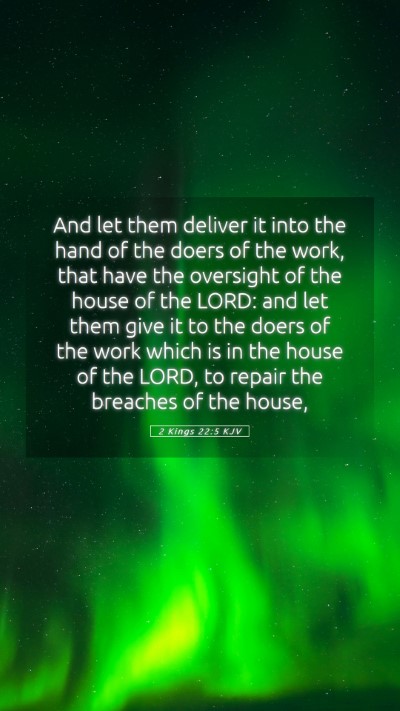Old Testament
Genesis Exodus Leviticus Numbers Deuteronomy Joshua Judges Ruth 1 Samuel 2 Samuel 1 Kings 2 Kings 1 Chronicles 2 Chronicles Ezra Nehemiah Esther Job Psalms Proverbs Ecclesiastes Song of Solomon Isaiah Jeremiah Lamentations Ezekiel Daniel Hosea Joel Amos Obadiah Jonah Micah Nahum Habakkuk Zephaniah Haggai Zechariah Malachi2 Kings 22:5 Meaning
What is the meaning of 2 Kings 22:5?
And let them deliver it into the hand of the doers of the work, that have the oversight of the house of the LORD: and let them give it to the doers of the work which is in the house of the LORD, to repair the breaches of the house,
2 Kings 22:5 Bible Verse Meaning
Understanding 2 Kings 22:5
The verse 2 Kings 22:5 states: "And let them deliver it into the hand of the doers of the work, that have the oversight of the house of the Lord: and let them give it to the doers of the work, which is in the house of the Lord, to repair the breaches of the house." This verse captures a moment in the reign of King Josiah of Judah as he initiates significant reforms in the worship practices of the Israelites.
Bible Verse Meaning
The meaning of Bible verses like this one often illuminates ancient practices that may not be immediately apparent to modern readers. This scripture highlights:
- Restoration and Repair: The primary context involves the physical restoration of the temple, a symbol of God's presence among His people.
- Delegation of Responsibility: The verse underscores the importance of appointing capable individuals to carry out God's work, emphasizing the need for accountability in ministry.
- Worship Practices: The intent to repair the temple connects to the theme of returning to proper worship and devotion to God, which had been neglected.
Bible Verse Interpretations
Using scripture analysis tools, we gain additional insights into the interpretations provided by notable scholars:
- Matthew Henry: He emphasizes that this moment signifies a return to order and reverence in worship. Henry notes that the neglect of the temple reflects spiritual neglect.
- Albert Barnes: Barnes sees this verse as a reflection of Josiah's commitment to restoring true worship among a people steeped in idolatry. He argues that the financial resources are being carefully managed for a holy purpose.
- Adam Clarke: Clarke expands upon the historical implications, suggesting that the desperate situation of the temple mirrors the spiritual state of the nation, underlining the need for a collective return to faithfulness.
Biblical Exegesis
In-depth Bible verse analysis of 2 Kings 22:5 provides a rich context of the historical realities faced by the Israelites:
- Historical Context: During Josiah’s reign, there had been a long period of neglect and idolatry. The restoration effort marked a significant turning point in Judah’s spiritual journey.
- The Role of the Temple: The temple was not simply a physical structure; it represented the covenant relationship between God and His people. The repairs signified restoration of that relationship.
Application of Bible Verse to Daily Life
Understanding Scripture can transform how we approach our faith and responsibilities:
- Commitment to God: Just as Josiah took steps to ensure the temple was cared for, we are called to care for our spiritual lives and communities.
- Delegation of Service: Recognizing and empowering others in service shares the burden and enriches the community of faith.
Bible Cross References
2 Kings 22:5 can be cross-referenced with:
- 2 Chronicles 34:8-10 - Chronicles the same reforms under King Josiah.
- Nehemiah 2:4-5 - Discusses rebuilding efforts which bear a similar theme of restoration.
- Matthew 21:12-13 - Jesus cleansing the temple, reinforcing the importance of maintaining holy spaces.
Conclusion
In conclusion, the significance of 2 Kings 22:5 is manifold; it serves as a call to restoration, accountability, and the importance of sacred spaces in worship. By engaging with these Bible verse meanings and interpretations, individuals can apply the lessons of this verse to their own lives, deepening their faith and understanding through careful Bible study insights.
This study demonstrates that exploring difficult Bible passages does not only enlighten one's understanding of Scripture but also encourages communities in their pursuit of a faithful life.


